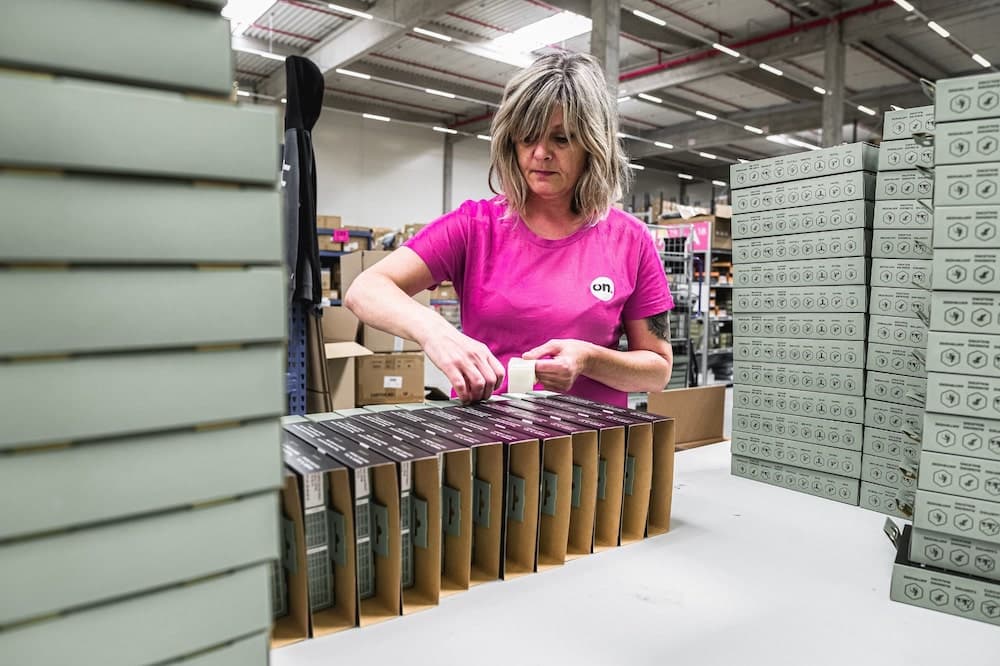What is fulfillment and what (dis)advantages does it bring?


Logistics is an integral part of any online store that sells a physical product. It is often seen as a “necessary burden of business” – it does not bring direct profit, on the contrary, it is associated with considerable financial costs and time consumption.
Yet it is often its quality that has a significant impact on the customer experience and is often a key factor in repeat purchasing decisions.
So how to approach logistics to exceed customer expectations and be a competitive advantage for your online store? There are two basic options. Either invest and build your own solution – warehouse, equipment, software, staff, etc., or outsource your logistics to an external fulfillment partner.
What is fulfillment
The term fulfillment originated in the USA. In logistics, it refers to the process that involves all the steps from ordering your products from a manufacturer or supplier to getting the shipment to the end customer and back.
Only when you outsource logistics to a specialist does the fulfillment process become a service. In this case, a situation arises where the seller does not get in physical contact with the goods he sells, everything is managed for him by the chosen fulfillment partner, who can usually report on the current status of his orders or current stock.
Such a fulfillment provider usually manages the logistics in its distribution center to multiple online players, which is where a number of (dis)advantages come. However, let’s go in order and tell you which processes to include in fulfillment.
Which processes fulfillment consists of
You probably know. Warehousing and inventory management, staffing not only for peak season sales, working with the right carriers, selecting and purchasing packaging materials, or picking and packing the products themselves. Including dealing with complaints, returns, inventory and more… The daily bread of any e-commerce store. And these are the parts of fulfillment. So let’s take a look at its core areas.
Receiving of goods
We know from experience that the goods receiving process is sometimes underestimated. However, it is its quality that determines the further flow of products within the warehouse. During the receiving process, a number of specific tasks can be carried out, such as quality or quantity checks, prioritization when receiving multiple receipts, and others. You can read more about goods receiving and its specifics in this article.
Storage
For product storage, it is important to provide suitable storage facilities with the required humidity and temperature, adequate storage equipment, insurance or security. An integral part of this is the warehouse management system (WMS), which manages various warehouse operations such as replenishment within a single warehouse, ABC analysis of stored products, defining the most suitable date and optimum quantity for ordering goods from suppliers, etc. You can read about how to stock goods for quick order picking here.
Picking
This process begins at the moment of order receipt and ends with the handover of the picked goods to the packing station. As with warehousing, there are several practical methods to ensure greater accuracy in order picking.
Packaging
Packaging is how e-commerce stores can differentiate themselves from their competitors. It all depends on the setup and strategy of the online store. Which packaging or filling material to choose? How much to individualize or personalize the shipments? Target more on price or packaging ecology.
Dispatch
On the one hand, the price for sending a package, on the other hand, the speed, quality and delivery methods. Choosing and working with the right carriers is a crucial decision for your business.
Reverse logistics
Returns and claims management replicates the order picking process, only in reverse. Unfortunately, there is no doubt it is a part of any e-commerce business, more so in some product segments and less so in others. Often, returns logistics is seen as an unnecessary extra cost that means doubling the work.
Other
However, the list of fulfillment operations does not end here. As with your own logistics management, a fulfillment partner is often able to offer you additional services according to your needs and wishes. This can include purchasing packaging material, in the case of custom packaging, packaging account monitoring, product kitting, cyclical or random inventory, bonded warehousing options to optimize your cash flow, product labeling, customs communication, and much more.
“At our distribution center, we understand the importance and power of our clients’ own brand. We therefore follow their specific requirements, so no exception is made for packaging in our own packaging material, using branded tape, embossing, engraving, attaching promo or gifts depending on the price of the order, or handwritten thank you notes in the language of the final destination of the package,” Roman Gabco, Head of Logistics Engineering Skladon.
Advantages and disadvantages of fulfillment
Just as there are two coin sides, fulfillment with an external partner brings a number of advantages and disadvantages as well. Each of these can be of greater or lesser importance, so you need to know them well before you start working with them. The (dis)advantages of fulfillment services are discussed in more detail in this article, but here we offer a summary of them.
Advantages of fulfillment
- Time saving: the online store can focus on other areas of its business, such as marketing, sales or product development.
- Eliminating worries about warehouse space and staff: a responsible fulfillment partner takes into account your changes in sales during the season and is able to allocate enough warehouse space and staff to ensure that your orders are processed smoothly even during peak sales periods.
- Reduced operating costs: by accumulating clients with a fulfillment partner, you benefit from reduced costs for warehouse staffing, packaging material, transport, (environmentally) waste disposal and more.
- Reduced fixed costs: at the fulfillment partner’s distribution center, you only pay for the space you are currently using. You do not have to deal with utilities or insurance.
- Redirection of investments: you do not invest in warehouse equipment such as shelving, work tables, handling equipment, printers or warehouse systems, etc. You can use the saved investment on other areas of your business.
- Removing logistical and legislative obligations: you don’t deal with contracts, internal regulations, permits, certificates, system audits or HSE.
- Relieve yourself of shipment worries: thanks to system maturity and automation on the fulfillment partner’s side, your shipments are delivered with superior accuracy and speed.
Disadvantages of fulfillment
- Poor quality collaboration: low quality collaboration can damage or even irreversibly destroy your business. Therefore, choose a fulfillment partner that best suits the nature of your business. Verify contracts, expertise, two-way communication, ask for details…
- Physical loss of control: you are putting your products in the hands of your fulfillment partner, so do your best to get to know the internal processes of their warehouse.
- Systemic loss of control: make sure your partner has a client application that will deliver complete and accurate information about your stock management, ideally in real time and 24/7.
- System connectivity errors: choose a partner that ensures seamless data transfer between your warehouse and their system.
Price of fulfillment
The price for fulfillment services can vary considerably from one provider to another – both in the way of invoicing and in its amount. There are providers who will charge you a fixed amount per month for the complete service, while at Skladon we approach the price individually – according to the warehouse operations performed in the ended month. We therefore work out the specific price with the client to meet his specific requirements.
As with our competitors, you can count on the following price list structure:
- receiving of goods;
- storage;
- order handling (picking and packing);
- transport;
- packaging material;
- reverse logistics (returns and claims);
- hourly rate for tasks beyond the quotation.
To compare the price of your own solution with fulfillment, we recommend working with the total price for processing one order. This is the most relevant indicator to help you decide whether a solution with a logistics provider is worth the cost in your case.
Are you looking for a way to quantify your own cost per order as accurately as possible and thus have a tool for comparison with a quote from a potential fulfillment partner? Download our logistics calculator to help you make your decision after entering your own cost items.
“When we compared the price with outsourced logistics, we came up with a 10-15% cheaper in-house solution. But we were comparing our situation at the time. When I add all the investment and the quality of the service Skladon provides, the outsourcing option is significantly better for us,” Pavel Kovar, Logistics Manager Kilpi.
Who is fulfillment suitable for
There are several fulfillment specialists on the Czech market. At first glance, they offer the same service, for the same segment and in similar quality. However, the opposite is true. Let us show you the most important differences, but there is always room for combination:
- Size of the online store: some of the providers have a minimum monthly order volume limit, so they are not available for smaller e-commerce players.
- Product turnaround: many fulfillment specialists focus on quick turnaround products, they are also warehoused to do so by the location and continuity of each site. However, there are also providers that target clients with long term stored goods, for which they primarily use pallet racking.
- Product segment: warehouse equipment may correspond to small products, typically in the categories of fashion, footwear, cosmetics, food supplements, books, small electronics and others. There are also specialists for bulky goods, classically for tires, furniture, garden supplies or fitness equipment, etc.
- Nature of the product: the external storage can also be equipped for the specific needs of the stored product in order to provide the required temperature, humidity or lighting.
- Quantity of products sold: the number of unique products, known in logistics as SKUs, also plays a role. A fulfillment partner may be prepared with their equipment and software for their narrow portfolio, but there are also specialists who do not have an internal limit.
- The degree of individuality: some fulfillment experts are able to respond flexibly to the specific and changing needs of their clients, which often reflect the brand setup and strategy, while others run in a high degree of standardization.
- Quality of customer care: at first glance a less important area, at second a cornerstone for building a mutually functioning partnership.
Therefore, it is impossible to say 100% for whom fulfillment service with an external partner is worthwhile. It always depends on the size and nature of the business and the specific business requirements and expectations. Therefore, we recommend that you approach the selection of a future partner with caution, for example, this guide can help you, which contains 50+ questions that are useful to know the answers to before starting a collaboration.
“At Skladon, we primarily focus on small and quick turnaround products of our clients, combined with a minimum monthly volume of 500 – 1,000 orders. We recognise the importance of their business specifics, which are very much visible in the branding. Therefore, we treat each client individually from the beginning of our cooperation and seek solutions to meet their requirements with the internal motto “As our clients grow, so do we”. An integral part of this is also a focus on the level of customer care that is an integral part of a functioning business relationship,” Tomas Kohut, CMO Skladon.
How to start cooperation with a fulfillment partner
The quality and speed of the start of cooperation is influenced by the internal setup of the onboarding process of the fulfillment provider, but also by the nature of the business and technical equipment of the onboarded client.
On the client‘s side, for example, the platform of the online store or other system (ERP, accounting, etc.) plays a role, which needs to be integrated into the fulfillment provider’s system for a smooth flow of data. The time capacity and expertise of IT staff on the online store side, or consideration of the ideal start date for the collaboration, which may not be immediate, also play a role in speed. In most cases, fulfillment service providers also allow the launch of collaboration on part of the sold inventory, so that online store representatives can test the operation of the service in practice.
On the other hand, each of the fulfillment specialists has already developed a larger or smaller portfolio of integrations. As a rule, they have connections to the most common box solutions of online store platforms (in the Czech Republic, for example, Shoptet, Shopify, WooCommerce, Upgates, PrestaShop, etc.), or to some extent they have experience and technical skills in connecting more complex ERP solutions, marketplaces, accounting software and others.
“At Skladon, we have a project-driven onboarding process for our clients, where we take into account the nature and specific needs of each client. This also determines the length of onboarding, which can range from one week for standard online store platforms, to months when we connect more sophisticated ERP systems such as SAP and others. Another great advantage is our connection to Baselinker, which opens up a number of additional benefits for us and our clients,” Rostislav Matejka, Logistics Engineer Skladon.
For more details on how the launch of the cooperation at Skladon is taking place in practice, please read this blog article.
In-house logistics or its outsourcing?
As you may have gathered from the article, there is no universal answer when deciding the future direction of your logistics. It all depends on the specifics of your business, the quality and focus of the fulfillment specialist you are considering. In any case, it pays to have the costs of both solutions – i.e. both in-house logistics and logistics outsourcing – calculated as accurately as possible.
The aim of this article was to provide a basic introduction to the concept of fulfillment, including its parts, advantages and disadvantages. We hope that you have found useful information. If you are interested in any of the mentioned areas in more detail, please feel free to use the links directly in the text or contact us at sales@skladon.cz. We will be happy to advise you on the next steps in your logistics management without obligation.
